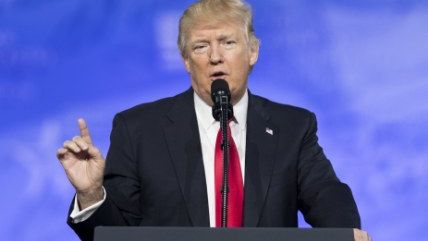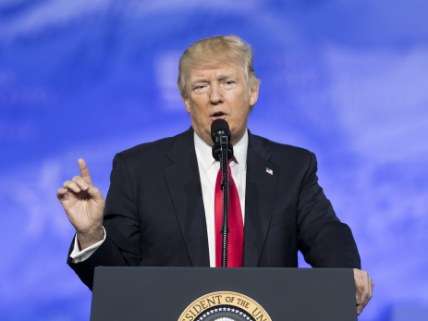Trump Vs. Leaks May Be More Important Than Trump Vs. Press
The 'fake news' fight a way to try to downplay embarrassing information coming from within.

When your boss calls you out in public for gossiping about company business:
The FBI is totally unable to stop the national security "leakers" that have permeated our government for a long time. They can't even……
— Donald J. Trump (@realDonaldTrump) February 24, 2017
find the leakers within the FBI itself. Classified information is being given to media that could have a devastating effect on U.S. FIND NOW
— Donald J. Trump (@realDonaldTrump) February 24, 2017
Those tweets from President Donald Trump this morning come on the heels of a CNN report that the FBI had refused a request from the Trump administration to publicly push back against previous news reports that associates of Trump's were in contact with Russian officials during the campaign.
The White House rejects that characterization and says that FBI representatives came to them to say the news reports were wrong. What the administration asked, White House spokesman Sean Spicer said, is for the FBI to publically state the truth.
It's all part of complicated, messy three-party conflict between the administration, leakers or whistleblowers (depending on how you feel about them) within the intelligence community, and the media reporting on all of it.
After Trump tweeted out the complaint about leaks this morning, he shifted oddly into accusing the press of making up the sources he had just accused the FBI of being unable to control in his speech at the Conservative Political Action Conference today. To wit:
[T]hey have no sources, they just make 'em up when there are none. I saw one story recently where they said, "Nine people have confirmed." There're no nine people. I don't believe there was one or two people. Nine people.
And I said, "Give me a break." Because I know the people, I know who they talk to. There were no nine people.
But they say "nine people." And somebody reads it and they think, "Oh, nine people. They have nine sources." They make up sources.
A little later he said:
They shouldn't be allowed to use sources unless they use somebody's name. Let their name be put out there. Let their name be put out.
Mind you, the Trump administration, like previous administrations, wants to use unnamed sources in the media when it serves its purposes. Indeed, in this very FBI story, the administration was asking for FBI officials to talk to the reporters "on background" to push back on the claims that there were communications with Russian officials.

So even though Trump this morning was complaining about leakers, just hours later he's saying that the media is just making up sources. It's not necessarily contradictory—one could believe both of these things depending on the situation or story—but in this case these two complaints seem to be about the same controversy. The Washington Post report about now ex-National Security Adviser Mike Flynn being in contact with Russian officials claimed nine sources. And Flynn resigned over all of this.
Obviously Trump is full of crap when he says he knows who the media is talking to or he wouldn't be complaining about the FBI's inability to stop leaking. If he knows who the press talks to, he can just go tell FBI Director James Comey, can't he?
But that's not really the point. As several of us have pointed out at Reason, the Trump administration is probably going to be the leakiest in modern history in ways they're not able to control. This is good because it will help keep the administration from operating in secret. It also can potentially be a problem as overly powerful, overly connected, and largely unaccountable bureaucrats and intelligence operatives use the adversarial relationship between Trump and the press to try to influence leadership and decision-making without having to take responsibility.
It's all very messy for the press and the public to navigate. Should we spend hours explaining the contents of a leaked executive order on LGBT issues before finding out whether the administration is seriously considering it? When it turns out the administration doesn't approve the order, was the coverage "fake news" or did negative reaction to the leak of the order help influence the decision—the old policy "trial balloon" tactic?
What Trump is attempting to accomplish here is clearly to attempt to dissuade the public from trying to navigate all this complicated coverage. News critical of the Trump administration is "fake news" and that's the end of it. Trump will let you know what's real. And indeed, some reporting of what is coming out of the Trump administration has turned out be inaccurate partly because of so many leaks, but also partly because of the rush to get information out as quickly as possible is causing journalists to make mistakes. Trump speaks vaguely about problems in Sweden and the press thinks he's falsely claiming there was a terrorist attack there. But he was actually talking about crime rates. He was still exaggerating the problem (and he brought the country up again in his CPAC speech), and his own inarticulate, stream-of-consciousness speaking style contributed to the mistake, but he never claimed there was a terrorist attack in Sweden, so now he has another "fake news" example to point to.
As for the leaks, Trump certainly isn't the first president whose administration conflates info that makes them look bad or to have possibly engaged in illegal or unethical behavior with information whose exposure has a "devastating effect on the U.S." Similar claims have been made under Barack Obama's administration against whistleblowers like Edward Snowden and Chelsea Manning with little evidence they're true. Trump is only different here for his crass way of openly berating people on social media in ways that most politicians tend to do behind closed doors.
Looking at this three-way fight, maybe the takeaway here is to pay closer attention to what the administration might do to leakers if they find them and maybe a little less about the media conflict. Neither Trump nor many media leaders can resist the urge to talk about themselves, particularly when they feel attacked. So this fight is likely to go around in a circle constantly for the next … oh, four years or so.
What the administration might do to those who leak embarrassing information or who blow the whistle to possibly illegal or unethical conduct is of more pressing concern. We all benefit from more information getting out into the public eye, even if it comes along with a challenge of trying to figure out what's real.
Read the transcript of Trump's CPAC speech here.
